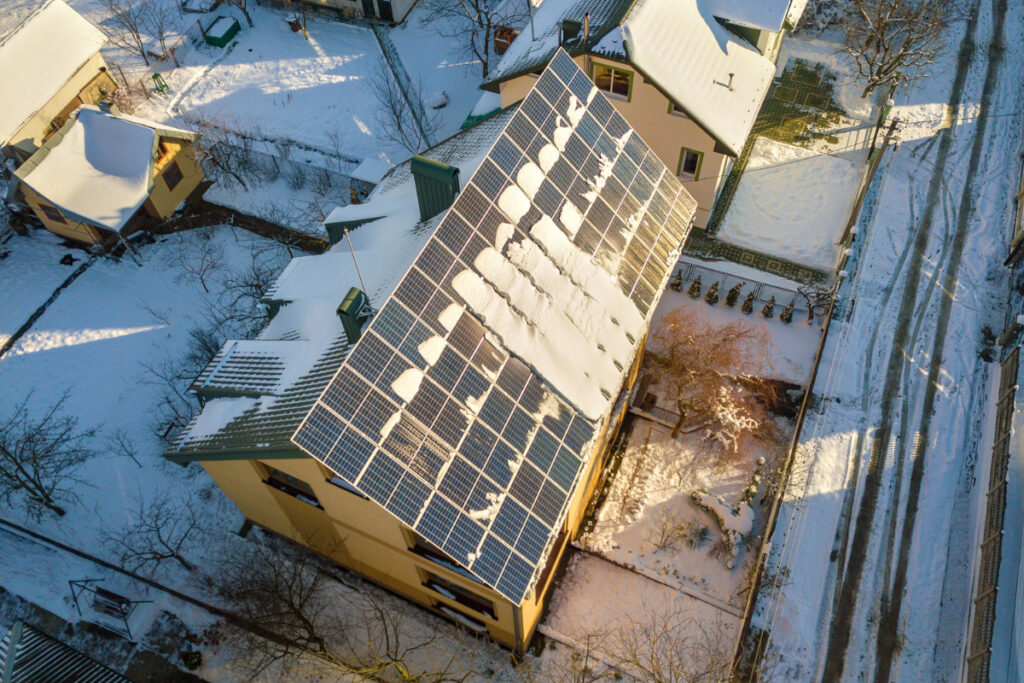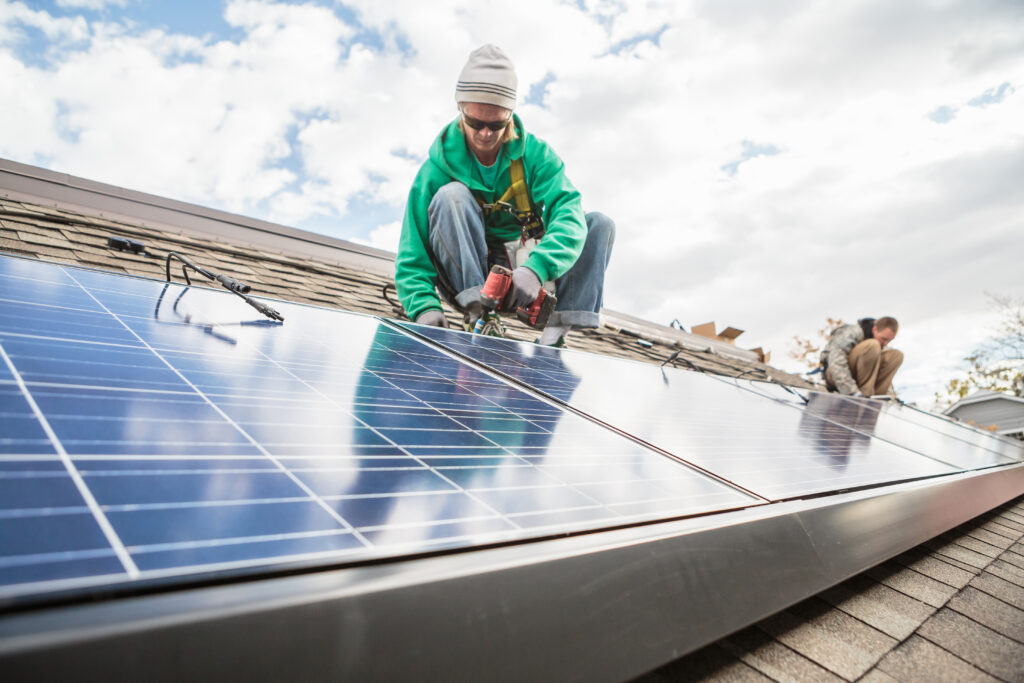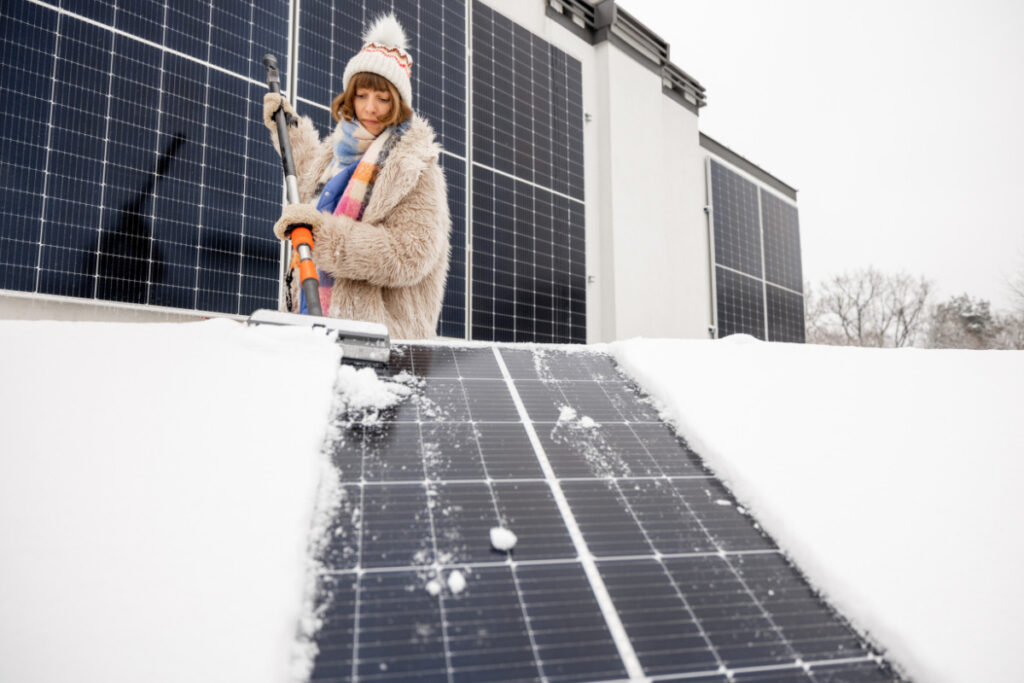Introduction
As winter months approach, many homeowners often wonder about the effectiveness of solar panels during this icy season. At DroneQuote, we understand your concerns and strive to provide accurate information to help you make educated decisions regarding solar energy solutions.
Let’s bust a myth about solar panel performance in cold weather and learn how snow and sunlight affect power generation. With this knowledge, you can optimize energy efficiency in winter and enjoy clean, renewable energy year-round.
Understanding Solar Panel Performance In Winter
This section will discuss whether solar panels can generate electricity in the winter. And also explore the factors that affect their performance during cold weather conditions.
Can Solar Panels Generate Electricity In The Winter?
Many people wonder if solar panels can produce electricity during the winter months. The answer is yes – solar panels are still effective even in cold weather conditions. In some cases, they may be more efficient due to their heightened sensitivity to temperature fluctuations. Even though there may be less direct sunlight available due to cloud cover or shorter days, solar panels can still convert daylight into usable energy as long as they receive some exposure to it. Snowy landscapes have also increased panel efficiency by reflecting light back onto them for extra absorption.
To transition to green living solutions like rooftop solar arrays, homeowners should assess their performance across all seasons. Advancements in solar technology now make it possible for people in different climates to reduce their environmental footprint by using clean and sustainable energy sources with improved power output and performance in all weather conditions.
Effect Of Snow On Solar Panels
During winter, snow can impact the performance of solar panels in both positive and negative ways. While it can reflect sunlight and increase light exposure to panels, heavy accumulation can obstruct sunlight from reaching them entirely. This reduction in energy production becomes more problematic when the snow compacts or turns into ice covering the panel surface. Although electronics within solar systems may be affected, solar panels are generally designed to function efficiently in varying temperature ranges.
Homeowners must monitor their rooftop systems during winter and take appropriate steps, like gentle clearing or prompt removal, to minimize potential issues. Proper maintenance in colder months ensures that your renewable energy source produces optimal power despite significant drops in outdoor temperatures.
Factors Affecting Solar Panel Performance In Winter
During the winter months, solar panel performance can be affected by various factors that impact their ability to produce electricity efficiently. One is temperature sensitivity, as solar panels perform better in cooler conditions, but extreme cold and ice cover could cause damage or reduce efficiency.
Snow accumulation can also hinder power generation by obstructing sunlight from reaching the solar cells entirely. Reduced daylight hours and low sun exposure can lower energy output throughout colder seasons. Changing climate conditions like cloud coverage can result in variable levels of renewable energy production.
For optimal efficiency during winter months, homeowners should consider proper installation strategies such as mounting angle adjustments or heated panels designed for handling colder weather more effectively. Regular clearing of accumulated snow will help reduce any potential loss in power output while minimizing possible risks associated with ice buildup on rooftop configurations. By understanding these circumstances and employing appropriate measures proactively, one can ensure sustainable living even amidst challenging seasonal variations.
Tips To Maximize Solar Panel Efficiency In Winter
Taking a few precautions is essential to maximize solar panels’ efficiency during winter. One way is to ensure that the solar panels are installed at an angle that will help them capture maximum sunlight exposure. The proper positioning can also prevent snow buildup on the panels, which can reduce their performance.
Another tip is regularly cleaning your solar panels and removing snow or ice build-up using gentle clearing techniques such as a broom or soft brush. This will keep your system performing optimally and ensure its longevity. Additionally, you may want to invest in heated solar panels if you reside in areas with icy weather conditions.
Lastly, homeowners should be mindful of the surroundings of their home that could impact solar panel efficiency in winter months. For example, tree branches or buildings casting shadows might decrease energy production during this period. By considering these measures and partnering with professional installation and maintenance service providers like DroneQuote, who offer quality materials, workmanship, and drone analysis, homeowners can optimize their savings while maximizing performance throughout all seasons.
Solar Snow Performance Explained
Discover factors affecting solar snow performance, and prioritize professional installation and maintenance for optimal renewable energy systems.
What Is Solar Snow Performance?
Solar snow performance refers to the ability of solar panels to generate electricity even when covered with snow. Although heavy snow cover can hinder the panel’s power output, a light layer of snow can enhance efficiency by reflecting sunlight onto the panel’s surface. However, excessive snow accumulation on a panel may form an ice cover that blocks sunlight and reduces energy production. Therefore, clearing gentle amounts of accumulated snow from your solar panels is crucial for optimal winter energy generation.
Factors such as mounting angle and sun exposure also play a significant role in determining solar snow performance. This means homeowners needing solar panels need professional installation services that ensure proper orientation and location for ideal sun exposure duration throughout winter. Moreover, high-quality materials with good thermal retention properties should be used during installation to prevent heat loss during freezing temperatures, promoting continuous energy production even during cloudy weather conditions.
Factors That Affect Solar Snow Performance
During winter months, the performance of solar panels can be affected by several factors. One such factor is snow coverage, which directly impacts the amount of sunlight that reaches the panels and reduces or completely eliminates power generation.
Another important consideration is the mounting angle of solar panels. To ensure maximum exposure to the sun’s rays in heavy snowfall areas, installing panels at a steeper angle may be beneficial to reduce accumulation and facilitate gentle clearing. Additionally, extremely cold temperatures can cause temporary decreases in power output until temperatures rise above freezing again.
Considering these factors when selecting and installing solar panel systems will greatly improve their performance throughout the winter months. Regular maintenance checks and gentle snow removal are also important for optimal efficiency during snowy conditions.
Importance Of Clearing Snow From Solar Panels
In winter, homeowners with solar panels need to clear snow accumulation from their panels to maintain optimal efficiency. A soft-bristled broom or snow rake is recommended to avoid scratching or damaging the surface of the panels. Some solar panel systems have built-in heating elements for cold climates. Still, others require careful removal by a professional technician in extreme conditions to prevent damage to components like wiring and mounting brackets.
Proper maintenance is key in maximizing the lifespan and performance of your home solar system. Clearing snow from your solar panel array during winter months will help you save money on electric bills while ensuring maximum energy production even in frigid temperatures! Keeping your panels debris-free and regularly monitoring them ensures continuous clean, renewable energy production year-round.

Benefits Of Installing Solar Panels In The Winter
Installing solar panels in the winter brings lower installation costs and a faster payback period, plus utilizing net metering during colder months can help save you money. Discover how installing solar panels during winter could be the best move for your home’s energy efficiency!
Lower Installation Costs
Installing solar panels during the winter can have numerous benefits, including lower installation costs. Solar panel manufacturers often reduce their prices in the off-season when demand for solar energy is relatively low. Moreover, since installers are typically less occupied during this time, they may provide discounts and negotiate customer fees.
In addition to cost savings on upfront expenses, homeowners who opt for wintertime solar panel installation can take advantage of various state and federal tax incentives such as grants, rebates, and tax credits that help offset some or all of the initial investment required for installing a home solar system.
By deciding to install their solar panels in colder months with fewer demand conditions, homeowners benefit from faster payback periods as they begin generating clean energy earlier in the year. In summary, it’s an excellent economical choice for individuals investing in renewable energy sources like solar power systems.
Faster Payback Period
Since energy bills usually run higher during winter, homeowners with solar panels can offset those costs and save more money. Installing winter solar panels has benefits, including a faster payback period. With net metering programs, excess energy produced by your panels during peak sunlight hours can be returned to the grid and credited to your account. This translates into lower monthly electricity bills and faster payback on your initial investment.
Additionally, installing solar in winter means you’ll start generating renewable energy sooner. This also means you’ll begin saving money earlier than waiting for spring or summer to install your system. Furthermore, some states offer rebates or tax incentives for installing solar panels before year-end deadlines, allowing homeowners to claim larger savings.
Choosing a professional installation company like DroneQuote ensures that your solar panel system will be installed correctly to maximize efficiency and generate greater cost savings over time. Choosing quality materials and workmanship combined with proper installation techniques for winter conditions makes it possible to experience an even shorter payback than average while enjoying all the benefits of clean energy use year-round.
Utilizing Net Metering In Winter Months
Installing solar panels during winter has numerous benefits, including using net metering. With net metering, excess electricity generated by solar panels can be sold back to the utility company and used as credits towards future bills. This is especially useful during dark winters when sunlight exposure is limited.
Homeowners can utilize net metering during winter to increase their overall savings on energy bills throughout the year. Additionally, an appropriately sized solar system installed in summer can generate enough electricity for daily use and produce extra credits that could cover most of your energy usage during fall and winter.
However, it’s important to note that different states have varying regulations regarding net metering policies and rates. To fully take advantage of these programs while maximizing solar panel performance efficiency all year round, working directly with an experienced professional installer who understands local jurisdiction requirements well is recommended.

Why Choose Professional Installation And Maintenance
Professional installation and maintenance of solar panels in winter conditions ensure proper insulation, thermal efficiency, and snow removal for optimal solar panel performance. Learn more about the benefits of choosing a reputable company like DroneQuote to install and maintain solar panels on our website.
Proper Installation For Winter Conditions
When it comes to installing solar panels in the winter, proper planning and preparation are crucial. Hiring professional installers who understand the challenges of working in cold weather conditions and can ensure the panels are set up correctly to withstand snow, ice cover, and the wind is important.
The angle of the mounting also plays a critical role in maximizing efficiency during the winter months. Choosing materials suited for harsh winter conditions is crucial when selecting components like racking, inverters, and wiring that can withstand low temperatures without failing or breaking down quickly.
Regular maintenance by certified professionals is essential for keeping solar panels operating efficiently throughout the year. Entrusting your installation needs to qualified experts will ensure quality results upfront, which means you’ll enjoy the consistent performance even when there’s heavy snow coverage or low sunlight during cloudy days in winter months.
Regular Maintenance And Monitoring
Regular maintenance and monitoring are essential to ensure your solar panel system functions at its best and lasts for years to come. This means taking care of physical damage or wear on the panels, checking connections and wiring, cleaning any dirt buildup or debris, and testing efficiency.
Ignoring these tasks can lead to declining performance or even total system failure. For instance, dirty panels reduce output by up to 20%, while loose connections create hotspots that cause permanent harm. Maintenance prevents such mishaps from occurring, along with optimizing energy production.
Companies that install solar panel systems also provide ongoing monitoring services remotely, enabling them to identify issues quickly and offer proactive solutions. Homeowners should regularly examine their own energy production levels, too, so they can report potential problems promptly. In conclusion, maintaining a renewable energy source would help protect your investment while gaining maximum results in the future.
Quality Materials And Workmanship
High-quality materials and skilled workmanship are crucial for installing and maintaining solar panels during winter. It’s essential to use top-of-the-line equipment that has undergone rigorous testing to ensure optimal performance even in freezing temperatures. Choosing cheaper or inferior materials can result in system errors, leading to reduced energy production, lower returns on investment, and increased operational costs.
Professional installers are trained in proper installation techniques tailored to winter conditions. They know how to adjust the mounting angle of solar panels to maximize sunlight absorption and anticipate potential issues like snow accumulation or ice covers that could affect power output. Homeowners should prioritize finding established and experienced contractors who use quality materials for their solar panel installations – it’s a must! Regular maintenance and monitoring by professionals are also important to keep the systems running smoothly throughout the year.
Conclusion
Myth busted: solar panels work in winter, even in extreme conditions. To optimize performance, understand winter factors and take measures like gentle clearing or heated panels.
Winter installation also comes with benefits such as lower costs and faster payback periods. At DroneQuote, we recommend choosing professional installation and maintenance for proper set-up in winter conditions and regularly monitoring your system’s quality materials and workmanship. With renewable energy becoming more popular, investing in solar power during the colder months could be an excellent decision for saving energy costs and creating a more sustainable future for all.

FAQs:
- Do solar panels work in the winter?
Yes, solar panels can work in the winter season, even on cloudy and snowy days. However, their efficiency may decrease due to shorter days and lower temperatures.
- How does snow affect solar panel performance?
Snow accumulation on solar panels reduces sunlight exposure and blocks energy production. Clearing off the snow periodically or using a tilt system that automatically removes snow can improve overall performance during winter months.
- Can I still generate enough energy from solar panels during winter?
It depends upon several factors, such as location, panel orientation & tilt angle. Generally speaking, people experience 70-90% power generation compared to summer months depending upon the climatic conditions of their geographic region.
- What are some best practices for maintaining solar panel efficiency during winter?

